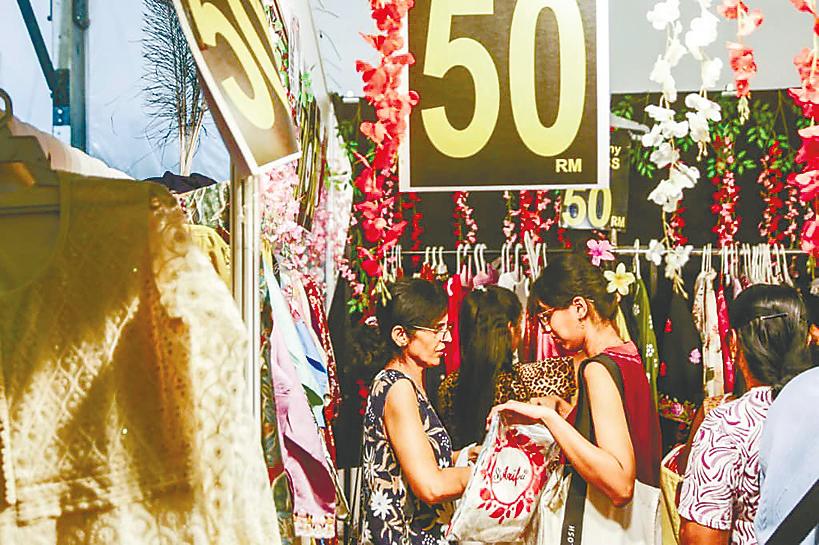KUALA LUMPUR: The Deepavali Carnival at Bukit Jalil, organised by Agenda Suria Communication, has grown into one of Malaysia’s longest-running festive bazaars, providing a vital platform for small businesses and entrepreneurs to tap into the lucrative festive season.
Now in its 23rd year, the carnival has expanded from its humble beginnings with 40 retailers at KL Sentral Kampung in 2002 to hosting 350 vendors this year. The event, which runs until the eve of Deepavali, attracts between 400,000 and 500,000 visitors annually.
Agenda Suria Communication head of marketing Vithya Shaline Jaggarao said the carnival has become a legacy event not just for shoppers but also for local entrepreneurs.
“We are known as one of Malaysia’s longest and largest running festive carnivals. This event marks 23 years of legacy, and we have seen generations grow with us throughout this event,” she told SunBiz.
The carnival relocated to Bukit Jalil in 2011 after redevelopment at KL Sentral, and has since cemented its reputation as a must-visit destination for festive shopping.
The majority of vendors, about 80% are local SMEs, while 20% are foreign exhibitors, particularly from India.
Vitya explained that the event’s objective goes beyond commerce.
“Our main objective is to help local businesses and SMEs uplift their business and provide them a conducive platform to boost visibility and sales. Many of these entrepreneurs have very unique products but lack the right avenue to showcase them,” she said.
The bazaar’s offerings largely fall under the fashion and lifestyle category, including saris, jewellery, accessories, home décor and gifts. Visitors also travel from neighbouring countries such as Singapore, Vietnam and Japan, many of them repeat buyers.
For jewellery entrepreneur Kaliswari, founder of Hiranya Jewels, the carnival has been a game-changer.
“This is my second year here, and the crowd has been amazing. On the first day itself, I managed to cover all my costs,” she said.
Having started her business at 19 with a small booth at a temple, she now runs a thriving brand both online and offline.
Her products range from invisible necklaces to Victorian sets and jhumkas, marketed as premium quality at affordable prices.
“I came here not just for business but also for exposure. I want customers to feel my product. I can easily sell at double the price, but I choose to keep it reasonable because I want everyone to experience premium quality items,” she said.
Kaliswari emphasised that Agenda Suria’s carnival provides both credibility and reach.
“Everyone in Malaysia knows Agenda Suria. Joining this event gives small entrepreneurs like us visibility we cannot get elsewhere,” she said.
For fashion designer Nithiyakalyani Mohan, founder of Nika Designs, the carnival has become a yearly commitment.
“This is my fourth year with Agenda Suria. It’s more than just business, we’ve built connections with regular customers who come back every year. Some even search for me if they can’t find my booth,” she said.
Her brand focuses on ethnic wear, particularly cotton-based custom designs. While she continues to run her online store, the bazaar gives her a unique advantage.
“In three or four days here, I can sometimes make more than what I do in a month online. Customers get to touch, feel and try the products, and that makes a big difference,” she said.
However, Nitya noted challenges, including manpower shortages and intense competition.
“Bargaining is part of the culture, and competition is high, especially in clothing. But I see it as a way to improve myself. What makes me stand out is that I design the clothes myself, and customers notice the difference,” she said.
Like many events, the carnival was affected by the Covid-19 pandemic. In 2023, it was moved temporarily to a convention centre in Subang Jaya due to restrictions.
While purchasing power dipped that year, Vitya said, 2024 saw a strong rebound.
“In 2023, income was lower compared to pre-pandemic years. But last year, it picked up and became normal again,” she said, adding that logistics remain the main operational challenge, though the team has largely perfected its template for execution.
As the carnival looks to the future, Vitya said the aim is to modernise while preserving tradition.
Plans include greater digital engagement, cashless payments and even artificial intelligence-driven interactive experiences.
“With strong support from ministries and recognition from the Malaysia Book of Records, we want to take this event to the next level by positioning it as a hub for Asean Indian entrepreneurs,” she said.









